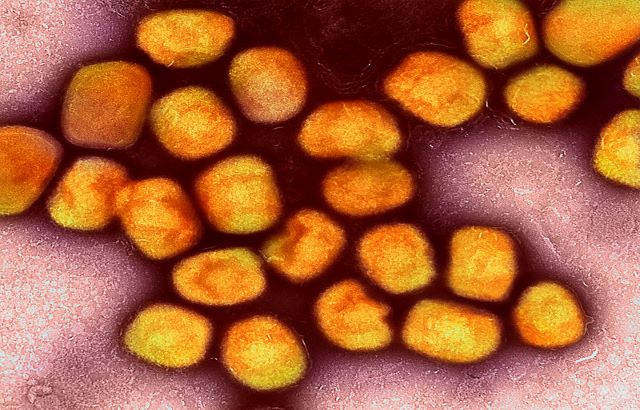Blizard academic leads first study of monkeypox infection in women
An international collaboration of clinicians, established and led by Professor Chloe Orkin at the Blizard Institute, has published the first case study series of monkeypox infection during the 2022 outbreak in cisgender (cis) and transgender (trans) women and non-binary individuals assigned as female at birth. The study provides new insights to inform the public health response to the ongoing outbreak.

Colorized transmission electron micrograph of monkeypox virus particles (gold) cultivated and purified from cell culture. Image captured at the NIAID Integrated Research Facility (IRF) in Fort Detrick, Maryland. Credit: NIAID
An international collaboration of clinicians, established and led by Professor Chloe Orkin at Queen Mary University of London, has published the first case study series of monkeypox infection during the 2022 outbreak in cisgender (cis) and transgender (trans) women and non-binary individuals assigned as female at birth.
The case series, published today (17 November 2022) in The Lancet, provides much needed insight into risk factors, routes of transmission and other clinical features of monkeypox infection. So far, these groups have been underrepresented in research and little is known about how the disease affects women. These data will help to guide the international response to the ongoing monkeypox outbreak.
This is the second monkeypox case series from the international group, whose first paper in The New England Journal of Medicine this summer identified new clinical symptoms of monkeypox in men. The study proved influential in shaping international case definitions, thereby contributing to the global response to monkeypox. These case series provide the most comprehensive picture of the ongoing monkeypox outbreak happening across the world, which the authors have discussed in a clinical overview of monkeypox for The Lancet Seminars, also published today.
Clinicians across 15 countries contributed data from 136 women (69 cisgender, 62 transgender) and five non-binary individuals with confirmed monkeypox infection between 11 May and 4 October 2022.
In the first case study series, sexual contact was the suspected route of transmission for nearly all (95-100%) men. In the latest study of women, sexual contact is likely to be the route of transmission for most (73%), but not all the cases. Differentiating between cis and trans women in these data reveals important insights; for example, sexual contact is the most common route of transmission for trans women, but nearly one-quarter of cis women in the study are suspected to have contracted monkeypox infection without sexual contact.
The women experienced a similar clinical presentation to what has been seen in men (mucosal sores and anal and genital sores). These clinical symptoms were frequently misdiagnosed as sexually transmitted infections (STIs), especially in cis women. While men and trans women were more likely to access sexual health and HIV clinics, most cis women attended a wider range of clinical settings including emergency departments, primary care and various hospital departments. This reinforces the need for education for health professionals beyond sexual health clinics to ensure that monkeypox symptoms are not misdiagnosed and to limit onward transmission.
Similar to the global case series in men, which identified monkeypox DNA in the semen of 29/32 semen samples tested, this case series found monkeypox viral DNA in 100% of vaginal swabs taken (14/14). This strengthens the likelihood of sexual transmission through bodily fluids as well as skin-to-skin contact. Although 26% of cis women lived with children, only two children acquired monkeypox - a reassuring and important finding, as children can be more severely affected than adults.
Research lead author Chloe Orkin, Professor of HIV Medicine at Queen Mary University of London and Director of the SHARE collaborative, said:
“During the global outbreak, case definitions have rightly focused on the most affected groups, sexually active men who have sex with men. The public health response has been tailored to reach this group. However, as the outbreak progresses, it’s important to also focus attention on underrepresented groups such as women and nonbinary individuals to better understand their risk. It is important to describe how the infection manifests in women as this has not been characterised until now and doctors need to be able to recognise the disease. These learnings will help inform and tailor effective public health measures to be inclusive of these groups.”
Research author Dimie Ogoina, Professor and Infectious Disease Physician at the Niger Delta University Teaching Hospital, said:
“This case series of monkeypox, which is the first to bring together cases from the global south and north, further illustrates that monkeypox is a problem for all genders and all regions. There is a need for more investment in surveillance, research and development to understand the differences and similarities in the clinical course and outcome of monkeypox in all affected regions, especially in Africa.”
Research author Asa Radix, Senior Director of Research and Education at the Callen-Lorde Community Health Centre in NYC and co-chair of the World Professional Association of Transgender Health, said:
“Individuals who identify as transgender, nonbinary and gender diverse are often absent from research representation. The inclusion of transgender women and nonbinary individuals in this series illustrates the importance of demographic and outcome data being disaggregated by both sex and gender and is key to improving ongoing monkeypox surveillance and targeted public health interventions.”
Dr Michael Brady, National Adviser for LGBT Health, NHS England and Sexual Health & HIV Consultant at King’s College Hospital NHS Foundation Trust, said:
"It lifts my spirits to read an academic paper that includes data on trans and non-binary people. For too long and far too frequently trans and non-binary people are absent from clinical research, despite the fact that they face some of the most significant inequalities in healthcare. Research like this, where the outcomes of trans and non-binary people are reported alongside those of cis women or men is essential and impactful and something I hope to see both researchers and academic publications replicating in the future."